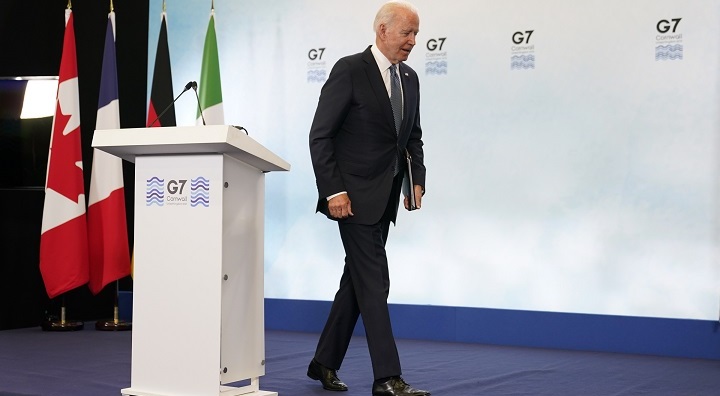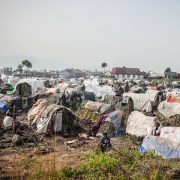
Looking at the global situation from China, Beijing still has a strong hand, but things could turn around very swiftly. Timing is very important and present posturing could be misleading.
US president Joe Biden went to the first COVID in person G7 last Friday ready to strike and impress the allies against China. He rolled out a massive plan to supply at least 500 million vaccines in a year to the developing world. He thus would prove the mettle of American science versus the lesser science (i.e. vaccines) from Beijing. This could then cast a shadow on the whole Chinese technology that Beijing wants to export to the world. Biden announced a massive infrastructure project to build roads and railways all over the world backed by trillions of the US pension and insurance funds. It promises to be better and thus beat Beijing’s Belt and Road Initiative (BRI). Last but not least, he showed off a bipartisan US $ 250 billion blueprint to relaunch American technology, leave in the dust Chinese hi-tech and deliver a new technological revolution.
This all can sound scary from Beijing but Chinese may pay attention also to different sounds coming from Washington.
US divisions
George Packer in The Atlantic argued that “we (Americans) remain trapped in two countries. Each one is split by two narratives—Smart and Just on one side; Free and Real on the other. Neither separation nor conquest is a tenable future. The tensions within each country will persist even as the cold civil war between them rages on.”[1]
And also: “I don’t much want to live in the republic of any of them. It’s common these days to hear people talk about sick America, dying America, the end of America. The same kinds of things were said in 1861, in 1893, in 1933, and in 1968. The sickness, the death, is always a moral condition. Maybe this comes from our Puritan heritage. If we are dying, it can’t be from natural causes. It must be a prolonged act of suicide, which is a form of murder.
“I don’t think we are dying. We have no choice but to live together—we’re quarantined as fellow citizens. Knowing who we are lets us see what kinds of change are possible. Countries are not social-science experiments. They have organic qualities, some positive, some destructive, that can’t be wished away. Our passion for equality, the individualism it produces, the hustle for money, the love of novelty, the attachment to democracy, the distrust of authority and intellect—these won’t disappear. A way forward that tries to evade or crush them on the road to some free, smart, real, or just utopia will never arrive and instead will run into a strong reaction. But a way forward that tries to make us Equal Americans, all with the same rights and opportunities—the only basis for shared citizenship and self-government—is a road that connects our past and our future.”
These words reflect Chris Caldwell’s deep book examining America.[2] The Constitution of the United States was de facto changed during the 1960s and this change is at the root of the present American issues also outlined by Packer’s “two republics.” It is a tectonic shift for America and it is very crucial for China. As long as this is the narrative in America about America, China will think it’s better off like it is now, and America, unlike until 2003-04, during the war in Iraq, is no longer a paragon of virtue, a model to follow.
Advice to Xi
Putting oneself into the shoes of an advisor to President Xi Jinping one could argue the following: “What is wrong with China’s policy now? We can say that perhaps there is nothing wrong with China now, and let’s look at our main competitor/adversary/enemy, the United States. America is coming out from a series of massive failures going back almost 20 years. The war in Iraq was a total failure. Hundreds of billions, perhaps trillions, were wasted in a conflict that didn’t give the United States control of the production of oil or of the transportation routes in the Eurasian continent. Conversely, it sowed new seeds of war and contradictions in a region already ripe with turmoil.
“The financial crisis of 2008 sowed doubts in the minds of the world about the feasibility internationally of the American financial system and stretched the doubts about the morality and ethics of Wall Street, which had been quick to castigate weak Asian economies in the 1998 Asian financial crisis, but with the same ease, ten years later swept Wall Street’s financial faults under the rug.
“The Jasmine Revolution didn’t improve the situation. The promise of creating a new order thanks to the uprising groomed and supported by the United States created failed states in Libya and Syria, and in the wake of this crisis, it opened the floodgates for millions of refugees from Asia and Africa to Europe. This in return created animosity in Europe against the United States. With Covid, America didn’t fare any better. At first the United States underestimated reports they received that were quite well informed about the real danger of Covid, and then when the epidemic came to the United States, it blamed just China without considering its faults in preventing the spread of the disease.”
“Then there was the Capitol Hill attack in January. It was an attack on American democracy and this attack was led by the American president himself. How can we believe in the strength of the United States? Possibly we have just to wait for America to fall apart and things will just fall on our lap. In fact, yes, there are a growing number of countries blaming China for its conduct in Hong Kong and Xinjiang, but more people want to do business in China. Our economy is booming. There is doubt all over the world about the efficacy of a representative political system.
“Russia, which was a few years ago leaning towards Europe, is now firmly on China’s side. Of course, anything can change, and Beijing must be on its toes. The years 2021 and 2022 will be crucial to see if America is turning around or not. In the meantime, however, it is wise for China to keep its stand and just wait and see.
“The 2022 Party Congress could be a good time to gauge how things are progressing.
“There are several elements that China has to be careful about in the future. The first is the efficacy of vaccines. If America and Western vaccines prove to be far more reliable and effective than China’s vaccines and manage to wipe out the disease in all countries, while Chinese vaccines prove less reliable and effective, this could be a success for the US. It could prove to the world the strength of the United States, because China would have started the epidemic, but America and the Western world would have ended it. This could be an extremely important sign for other developments to come.
“The other element is building a coalition. So far, American allies, who have been cold-shouldered for many years by the United States for one reason or another, now are reluctant to rejoin America in some kind of cold war against China. They think that at a later stage they might also be cast aside and therefore they are trying to weigh their options.
In this case, China has every interest and every opportunity to win even partially somebody back in a massive charm offensive. However, if America manages to change the pattern of its alliances, it could manage to win over effectively a growing number of countries. China should take careful notice of this development because it could impact heavily on economics and the overall political environment around China.
“The massive injection of capital to restart the Western economies is already creating a wave of economic growth in America, Europe, and other related countries. There are signs that this will create inflation. Inflation could be hard for Western countries, which have defeated the rise of prices for the past 40 years. This could create bigger problems in China, which for the whole period of reforms experienced basically no sustained and massive price hikes, although some waves of inflation had occurred in different time periods. Massive inflation, imported through rising prices of raw materials, will impose difficult choices for the Chinese currency, which is not fully convertible. Will China devalue, revalue its RMB or keep it stable? Any choice has steep costs, which are new after 40 years of almost linear growth.
“But these are so far all elements to pay attention to. They are not reality, at least not yet, so one should not hasten to move one way or another, because many things could turn out differently in the following months or years. Therefore, China’s best choice is to wait. Other elements to pay attention to are the results of the massive 250 billion dollar plan to restart American technology in an undisputed leading position and plans to start some global infrastructure project, The Blue Dot, together with Japan and Australia[3] that would rival China’s BRI. Progress in any of these areas should be quickly registered.”
Future in the past
Then for America and China, one way to look at the future is, as usual, to look at the past, in this case at Roman history.
There’s a precedent for America’s blues in Rome, which faced built up resentment against the aristocracy ruling the country. Starting from the end of the Punic wars, in the first century BC, when the Roman Republic had vanquished its old enemy Carthage and conquered the Hellenistic kingdoms of the eastern Mediterranean, the many old simmering social issues burst into the open.
Rome witnessed civil wars between popular Marius and aristocrat Sulla that transformed the army from loyal to the Republic to loyal to the generals and their ability to distribute spoils of war to their legionnaires. Slaves rose up following Spartacus, shaking to the ground the Roman production system. Arch aristocrat turned radical democrat Catiline plotted to topple the Republic just to be stopped by Cato and homo novus (newcomer, new rich) Cicero. Christianity polarized, systematized, and spread ideas of equality that in the long term helped to reshape the empire.
Facing all of these challenges, Rome bent rules, the foundation of the res publica, and even trampled them. The aristocratic ideal of individual freedom—something that could be lost through defeat in war or financial debts, and could be recovered through parallel and opposite patterns—gave way to cries for social justice and freedom for all.
The issue was not simply domestic. The issue of Roman control of the Mediterranean rose in Rome at a time when Rome had just become an empire by defeating another empire, the Phoenician of Carthage, and closing centuries of animosity between Phoenicians and Greeks. Romans were facing the sudden dilemma of absorbing barbarians as new Romans or just enslaving them. Moreover, during the wars, Romans became rich and some remained poor, sometimes poorer than the noblest of barbarians (especially Greeks) taken into top Roman echelons.
We can find parallels in modern American history. There is the idea that America could be more resilient than Chinese expect not despite its troubles, but because of its troubles.
Both Roman and Han empires experienced deep crises at the end of the third century AD. Rome emerged from it by making its internal social challenge, Christianity, the official ideology and by dividing the empire in two halves. The Han broke the empire up for good and the Tang reestablished unity only some five centuries later with a semi-barbarous dynasty resembling possibly the Frankish kingdom in Western Europe. Yet differences in China might have been even more remarkable than in Europe.
In China after the third century, the land fragmented and Chinese koine, common culture and language remained but there was no realistic horizon of political unity. Cultural-religious imports were changing China’s cultural DNA with new concepts and words. Massive influence from India and Buddhism transformed China. A concept that became fundamental for Chinese culture, “emptiness” kong 空, took hold of the new Chinese cultural koine, while political unity disintegrated and the Xiangbei, a proto-Mongolian population, had become dominant with their language and customs.
The Roman empire had Christianized before its division and Christianity gave it a sense of unity and continuity besides the Greek-Roman (Latin-Greek) tradition. In fact, we find a sense of unity of the Roman world that went beyond and besides the ruling emperor or dynasty.
The same thing didn’t happen in China. In the third century AD, at the time of the Three Kingdoms, we can see that famous strategist Zhuge Liang’s success was preventing the reunification of the empire under Cao Cao, and vice versa. In a way, all contestants were unwilling to compromise to save a thing common to all, a res publica. The rule and the empire belonged to one man and one dynasty only, and the empire would rather split, than fall under another man’s rule.
The same could be seen at the time of the civil war in the 1930s and 1940s between Nationalists of the KMT and Communists of the CCP. Mao eventually succeeded because he managed to move around the three main “internal” players, the KMT, the Japanese, and his CCP, but also with two other very important “external” players, the USA and the USSR. Zhuge Liang didn’t have similarly important external players.
Has China changed since then? What is the situation now? If in the following months Biden fails, then China can pick up the pieces. If Biden starts to deliver in any of its three areas, Beijing’s bargaining position could become weaker and then the US might be unwilling to talk and compromise with a losing China. It could happen all very fast and then Beijing would be on the wrong foot and off balance. Could China’s cumbersome, highly hierarchical and slow decision-making processes keep up? The next few months will arouse an answer.
[1] See https://www.theatlantic.com/magazine/archive/2021/07/george-packer-four-americas/619012/ I thank Ambassador Donald Keyzer for pointing me to this essay.
[2] Chris Caldwell, The Age of Entitlement: America Since the Sixties, 2020. I’m grateful to Chris for the enlightening conversations.
[3] See for instance https://asia.nikkei.com/Spotlight/Belt-and-Road/Biden-pushes-Belt-and-Road-rival-Blue-Dot-with-Japan-and-Australia






extremely mediocre analysis given by a so called academic that over the years has proven to be mostly wrong in his assessments. It seems that the man is not engaged objectively with reality and ins spite of being a so called sinologists seems to not understand chinese history and in spite of being an italian misrepresents roman history.
“The massive injection of capital to restart the Western economies is already creating a wave of economic growth in America, Europe, and other related countries. …….”
Capital is the ability to produce, to provide products to sell. Trump and Biden, and US Congress and the Fed, produced trillions of dollars out of thin air but not yet the plants to produce, the modern railways to transport, the infrastructure to control rivers and rain water and much more that in a modern country would have been maintained and improved over the last half century. Those investments will have to be made if US is again to become a modern country.
Look at an industry US doesn’t have: 5G. This is likely to make China’s industries much more efficient. See for example the articles by David Goldman on the subject in Asia Times.
Look at the industry US does have: the arms industry. It produced the badly conceptualised Zumwalt, LCS and Enterprise warship classes. It produced the similarly flawed F-35A, -B and -C aircraft in a mistaken effort to save money on production. All take an enormous amount of time to develop. China’s much less expensive armaments (about 2% of GDP against about 3.5% in US) develops its weapons faster. Remember a Chinese general saying in 2009 that its stealth fighter which would fly for the first time in 2011 would be taken into service in the 2017-19 period. In the end that was early 2017. The effectiveness of armaments is only shown in war and let’s hope we will never see it tested. But China may well be able to deter US aggression and win without war for example wrt Taiwan.
For the development of the value of non-aircraft capital investment in US see this article by David Goldman:
https://asiatimes.com/2021/06/all-demand-and-no-supply-means-inflation/